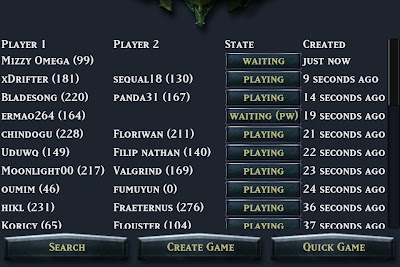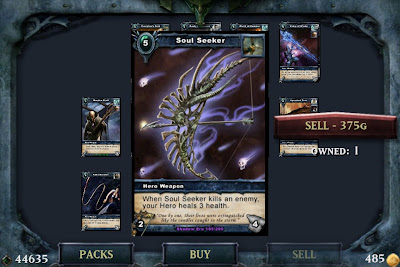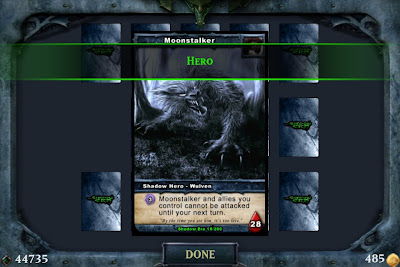Shadow Era, a Great Multi-Screen Trading Card Game
Today, I would like to introduce you to Shadow Era, a free online collectible trading card game (TCG) for iOS, Android, PC and web browser.
Those of you who know Magic: The Gathering will feel right at home with Shadow Era.
A bit about Magic: The Gathering, the game that started it all
(Originally created by Richard Garfield and published by Wizards of the Coast)
For those who don't know Magic, the first TCG, I can only recommend it to you. Due to the thousands of cards created and added since its first introduction in 1993, it's probably one of the most advanced TCG. New expansions are added regularly, bringing with them new concepts and game mechanics, which is why the Magic is so rich. Besides, there is also an online version.
Magic has players taking the roles of sorcerers dueling with their spell represented by cards in decks of 40 or more cards prepared in advance by the player. The deck-building is actually as crucial as the playing.
Cards are available in starters (usually 60 to 75 cards) or boosters (15 cards). Cards have different level of rarity. Typically, in a Magic booster pack, you get one rare, three uncommon and eleven common cards.
Also, in order to keep a balance, cards are limited to four of the same, except for the basic lands --the cards that produce the magic energy necessary to cast spells.
If you want to have an overview of the rules and how the game plays, have a look at this site here.
Some people just collect the cards because they are illustrated by various renowned and talented illustrators and painters.
But let's get back to the object of this article.
Shadow Era
The game is free to download and play.
It has now 200 cards and counting, and it's pretty fun to play. It's basically like playing cards, with a few fancy animations here and there, but overall, you will have the same feeling as if you were playing Magic.
When you first register, you can choose a starter deck with a Hero and a set of assorted cards.
In Shadow Era, you goal is to kill the opponent Hero. The Heroes influence the cards you can choose to build your deck. There are two camps: the Shadows and the Humans.
Human Heroes can be of the following Classes: Mage, Hunter, Warrior, Priest or Rogue.
Shadow Heroes can be of the following Classes: Mage, Hunter, Warrior, Wulven or Elemental.
The Hero you will choose will determine the Allies (creatures that attack for you), Abilities (spells like Fireballs or items to draw additional cards), and Hero Weapons and Armors you can include in your deck.
- Basic gameplay
You can have a look at the rules here.
Below, the structure of a turn, from the official site:
Turn Phases Overview:
Draw
Sacrifice
Action
-- Target
Finished
 |
| During your turn, you can change the camera view and check zoom in the cards in play and in your hand. |
 |
| As you earn XP, you level up and can fight stronger opponents in single mode, thus gaining more XP. |
Starting player is chosen randomly. On her first turn the starting player skips her Draw phase. Then she will choose one card to Sacrifice (this can be skipped). Sacrificed cards add up to constitute the pool of energy necessary to cast spells. All cards have an energy cost indicated in the top-left corner. Energy refills at the beginning of each player's turn.
The Action phase allows players to either cast Allies, Abilities or Weapons/Armors into play, as well as activate Allies, Heroes or Items' Abilities.
Compared to Magic, Shadow Era simplifies the gameplay by not allowing players to do anything during their opponent's turn.
If a player has Allies in play, she can then command them to attack either enemy Allies or Hero.
Unlike Magic, in Shadow Era damages on Allies are permanent.
Then it's the opponent's turn.
As soon as a Hero's life points reach zero, the game ends.
- Multiplayer
The Challenge mode allows for PvP (Player versus Player) fun. And it's really thrilling. You can choose Quick Game and play against a random player. You can also create a game and wait for opponents to come, or search for a specific player to challenge.
 |
| The online multiplayer lobby: you'll probably not wait long to find a player |
Since the game is turn-based, there is not much to worry about lag. If you loose the internet connection, a countdown of around one minute will be displayed on screen to warn you and let you fix the connection (it happens sometimes when your phone tries to connect to an unknown WiFi spot without real connection to the internet). When the countdown reaches zero, you are kicked out of the game.
There is also a countdown for every action. Time is added after you take some action in game (for example, you have 30 sec left and you attack an opponent's Ally, then 15 seconds or so are added to your available time).
If you fail to take any action during the allowed time, your turn simply ends and the game continues with your opponent's turn.
Rating system:
The first time you play a duel, your Rating is zero. After a win, your rating goes up. If you lose, it goes down. The rate of points you earn or lose depends on the difference between the two players' Ratings.
There is something really thrilling about playing a multiplayer game of Shadow Era because --like with most wargames and TCG-- it is not only about who plays better, but also about who built the best deck.
- Deck building
Personally, I find deck building is as much fun as actually playing your deck, if not more. You choose your cards carefully, try to balance everything so that your deck is the best possible. You are given a lot of liberty in the choice of the cards and you can include as many as you want.
 |
| Upper screen: your current deck. At the bottom: your available cards. |
That's also why some beginners might feel more secure with a big deck. After all, the more cards, the less chances to lose from the one-damage dealt every time you have to draw a card and you don't have any. However, it's more like the opposite. The more focused your deck, the better.
 |
| You can save a deck for each Hero, "in da cloud". |
 |
| The world map, where user chooses what Hero fight against... or creates a custom deck and plays against it |
Tip for the beginner: don't try to pack all the cards you can in a single deck!
A deck of 100 cards is usually much weaker than a deck of 30-40 cards, simply because by adding cards you lower your chances to draw the best ones.
Statistically I can guarantee you it holds true: the toughest duels I had so far were against those players with less than 50 cards. When I see someone has 80 cards, I am almost sure I am going to win. When I see someone with 40 cards, I am more careful :)
At first, if you are not ready to spend some cash to try various decks, try to focus on one single Hero and build a deck around him.
This brings us to our next part: the game's store.
- In-game store
 |
| The Merchant menu showcases the packs like a real life TCG. |
 |
| Each card has its own value, based on rarity, effect and offer and demand. |
 |
| You can sell your useless cards for half their acquisition value. |
 |
| A booster pack: 100 Shadow Crystals. |
 |
| A starter pack: same price for more cards, but no uncommon, rare or epic. |
 |
| Much like with a real world TCG, opening a booster is a thrilling experience. |
 |
| Tap the cards (face down) to reveal them, and pray for some Epic to show up. |

